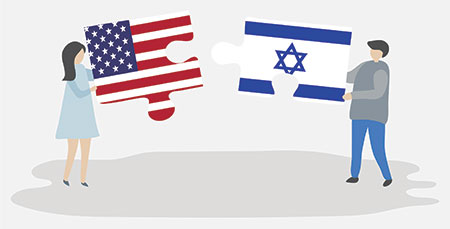Israeli Scene
News + Politics
Israel and America, Building Bridges by Airing Differences

Nothing could be more indicative of the crisis facing relations between American Jews and Israel than the claims—on both sides of the ocean—that we no longer need each other. It is well known that Prime Minister Benjamin Netanyahu, when pressured by progressive American Jews to make accommodations to the Palestinians or to risk his government by reaching out to Reform and Conservative Jews, has on more than one occasion said essentially this to his advisers: “American Jews are disappearing. Between intermarriage and assimilation, they are not going to be around for very long. Why on earth should Israel shape its foreign or domestic policies to please a community that will soon be gone?”
As shocking as we may find such sentiments, we should note that some American Jewish leaders have made similar remarks about Israel.
Rabbi Shmuly Yanklowitz, a popular Orthodox rabbi from Phoenix who was twice listed by Newsweek as one of America’s 50 most influential rabbis, wrote in April 2018 in the Los Angeles Jewish Journal: Despite being taught for so long that “Israel is the playing field for Jewish life” and “those of us outside of Israel are merely on the sidelines,” the opposite is true. As time goes on, he wrote, Israel may become “less significant and central to the success of global Jewish life.”
In fact, he insisted, those very same liberal values that Netanyahu believed would guarantee American Jews’ demise were the values that would actually lead Israelis to want to be part of American Jewish life. In the United States, he said, “we engage with great respect with other cultures, bring Jewish values into the public marketplace in healthy ways and have a full spectrum of pluralistic ways to engage with Jewish life.”
Though many of us believe that today’s nadir in the relationship between American Jews and Israel is new, the truth is that tense relations between the two communities have been the rule. As early as 1901, Theodor Herzl wrote an open letter to American Jews saying, “America, with its Jewish population growing day by day thanks to Jewish immigration, has not fulfilled its obligation of participating in the Zionist enterprise to an appropriate degree. Friends, brothers, awaken! We need your support, not merely your enthusiasm that emerges from your mass gatherings but then disappears like a whiff of smoke.”
In Israel’s early years, its first prime minister, David Ben-Gurion, had a well-known brouhaha with Jacob Blaustein, the president of the American Jewish Committee, which was divided into two camps—a non-Zionist and an anti-Zionist one. Where Ben-Gurion saw Israel as a rebirth of Jewish peoplehood, Blaustein was among many of American Judaism’s leaders who saw the state merely as a utilitarian solution to the problem of the hundreds of thousands surviving Jews of Europe.
The complex relationship between American Jews and Israel is thus nothing new. There was a brief honeymoon period between the 1967 Six-Day War and the 1982 Lebanon War, but, for most of the past century, the two communities have failed to build a solid relationship because they have failed to talk openly about how different they are. America, after all, was created to be, in Emma Lazarus’s iconic words, a home to “huddled masses yearning to breathe free,” regardless of their race, religion or ethnicity. But Israel is, in the words of the Balfour Declaration, a “national home for the Jewish people.”
America and Israel have both provided its Jews with brighter futures than anyone could have dreamed. Now, with the world darkening for Jews, is not the time for the two largest Jewish communities to declare that they do not need one another. This is the hour to change the conversation between us, to begin to appreciate both how successful we each have been but also how we have found vastly different ways to live Jewishly.
Imagine a world in which Israelis studied American Jewish history and American Jews were infinitely more conversant in Israel’s history, a world in which Israelis were sympathetic to the challenges American Jews face and American Jews knew enough Israelis and read enough Israeli literature to feel for the tensions that are part of Israeli life. What would happen if journalists, intellectuals and public officials from both nations spent time together and got to know each other, the community on the other side of the ocean, not to convince, but rather, to learn.
None of these connections will end the disagreements between us, but they could change the dynamic. Each of us would come to see that the other has different hopes for a Jewish future and differing conceptions of what it means to flourish Jewishly. It is understanding, not necessarily agreeing, that is crucial. Only if we first acknowledge how different we are can we begin the sacred work of healing the relationship and ensuring that the Jewish people remains—as it has always been—one people, with one shared destiny.
Daniel Gordis is the Koret Distinguished Fellow at Shalem College in Jerusalem. His latest book is We Stand Divided: The Rift Between American Jews and Israel (Ecco).










 Facebook
Facebook Instagram
Instagram Twitter
Twitter
Leave a Reply